Search | Image Archive | Reference | Communities | POV | Lesson Plans | Credits
 Vulcan Iron and Engineering Works, the largest of Winnipeg’s foundries, occupied several city blocks along the Canadian Pacific main line in Point Douglas.
Vulcan Iron and Engineering Works, the largest of Winnipeg’s foundries, occupied several city blocks along the Canadian Pacific main line in Point Douglas.
At the turn of the century, the railway was at the centre of the Winnipeg economy. In addition to the shipping and wholesaling that made it a major transportation hub, the city was also the centre for railway construction and maintenance.
Hundreds of Winnipeggers of all levels of skill and training were employed by the railway at shops like those in Canadian Pacific’s Weston Yards to maintain rolling stock and engines. Not all of the work, however, was done in the railway’s own shops. Much of the work was tendered out to the many contract shops. Among the contract shops there were three giants, Dominion Bridge Works, Manitoba Bridge and Iron Works, and Vulcan. These large operations contained foundries as well as machine shops, turning out everything from large cast boilers to rolled steel railway rails to precisely machined parts for tractors and engines.
The workers at the contract shops tended to work longer hours and in poorer conditions than those directly employed by the railways, and they earned less. Discontent with working conditions resulted in several bitter strikes in the latter years of the War, but with little gain. Vulcan’s general manager L. R. Barrett was very hostile to organized labour and represented the view of many enterprise owners when he uttered, “God gave me this plant, and by God I’ll run it the way I want to!” Any attempts to organize was suppressed, and employees were fired if they were suspected of holding union membership.
Since working conditions and wages at the three “Ironmasters” tended to set the tone for other employers in the city, they became the site of several targetted labour actions at the close of the First World War. In the early summer of 1919, metal workers at Vulcan joined with workers at Dominion and at Manitoba Bridge in a combined strike. Members of the Metal Trades Council across the city joined in a sympathetic strike, a significant step in the escalation that led up to the Winnipeg General Strike.
See also:
Historic Sites of Manitoba: Vulcan Iron Works (105 Maple Street North / 120-150 Sutherland Avenue, Winnipeg)
Page revised: 22 September 2015